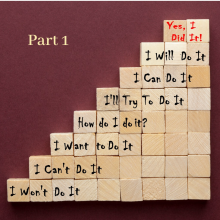Habit Change: An Introduction

This is the 1st installment in my 4-part Habit Change series:
- An Introduction (this post)
- The Stages of Change
- The Habit Loop
- SMART Goals
It’s almost the end of January 2020. Did you make any New Year’s resolutions?
By now, a lot of people already see themselves as failures for not sticking to their stated goals 100%—or even 10%. Let me be the first to say, if this is you, you are not a failure.
As coaches, we’re often asked, ”How do I stay motivated?” Like most things in life, it’s a process.
Plus, there are more things influencing our brains and decisions than we ever imagined.
Let me back up and say, goals are good. They’re actually great. New Year’s resolutions are goals. For some reason, a lot of negative feelings accompany these goals when we don’t follow through, more so than at any other time of the year.
So, why is there so much pressure around New Year’s resolutions?
Starting a new year is symbolic of a clean slate. It’s as if we’re starting from scratch. We know this isn’t true, but January 1 feels like a new beginning.
Throughout the world, we simultaneously say good-bye to old habits and hello to new ones. This alone can feel motivating.
Personally, I don’t set New Year’s resolutions, at least I don’t call them that. I’m not sure when I stopped referring to them as such. Maybe it was after so many years of failed attempts at making changes. Every time, I felt a bit like a failure, as though I wasn’t cut from the same cloth as others who were sticking to their goals. Like I just didn’t measure up.
At some point, thankfully, we were given permission by thinkers, coaches, therapists, psychologists, and counselors, that it was ok to NOT set New Year’s resolutions. Not that we needed anyone’s permission to do something different, but sometimes old habits die hard.
No matter what you call them or when you begin them, goals, intentions, and resolutions are the beginning of change. The new year is a perfectly good time to set goals if this works for you. Christmas kicks my butt every year. With all the extra errands, traveling, company, cooking, shopping, and decorating, I’m eager for a routine when it’s all over. Setting goals or establishing resolutions helps me get back on track.
How can we be more successful at accomplishing our goals?
It starts with an understanding of the process of change.
But know this. Even with this understanding, your body and brain could be working against you. I mention this because many of you who visit our blog have chronic illness. You’re here because you’re interested in healing. And it can be incredibly frustrating to set goals again and again.
Also know this. As your body heals, it will work with you instead of against you.
Not so long ago, we were taught that the brain is independent—responsible for emotions, mental illness, mood, discipline, etc. We were taught chemicals in our brains can be out of balance and that medications were the best practice for remedying this situation.
Now we know that there’s a huge food and mood connection. Jill even wrote an ebook about this a few years ago.
Dr. Deanna Minich, IFMCP, in this article, discusses how after just two days of eating increased calories, saturated fats (think fast-food), and sodium, our mood can become more depressive. Just 2 days!
If we’re depressed, it makes changing habits and accomplishing goals all the more challenging.
The National Center for Complementary and Integrative Health published an article on the connection between gut microorganisms and the brain showing how pathogenic gut bacteria have now been linked to anxiety, depression, autism, and hyperactivity.
If you enjoy podcasts, check out the Mood Altering Power of Food and Farming. It’s a great conversation between Dr. Mark Hyman and clinical psychologist and Columbia University professor, Dr. Drew Ramsey. They discuss using food to improve our mood and health as well as the benefits of growing our own food.
And food isn’t the only factor adding to our challenge in sticking to our goals. Our brains are compromised by toxins found in our water, air, personal care products, and the vaccines we receive as children and adults.
Yes, toxins in vaccines can affect our brains. In case you missed it, you can read Jill’s thoroughly researched post on the lack of vaccine safety here. (There’s a PDF version at the end of that post.)
So…before you call yourself a failure, consider whether the cards are temporarily stacked against you. As you establish your goals, keep in mind that as your health improves, your brain and mood will most certainly improve, meaning that discipline, consistency, and motivation will become so much easier. That positive, feed-forward cycle!
Lasting habit change is a process. Shortcuts might work initially, but sustainable habit change requires thoughtful attention: planning, execution, curiosity, and a willingness to restate our goals when needed.
In Habit Change Parts 2, 3, and 4, I will share strategies I’ve used myself and that are recommended by leaders in the habit change, psychology, and wellness fields.
Here’s to a successful 2020!
Add comment